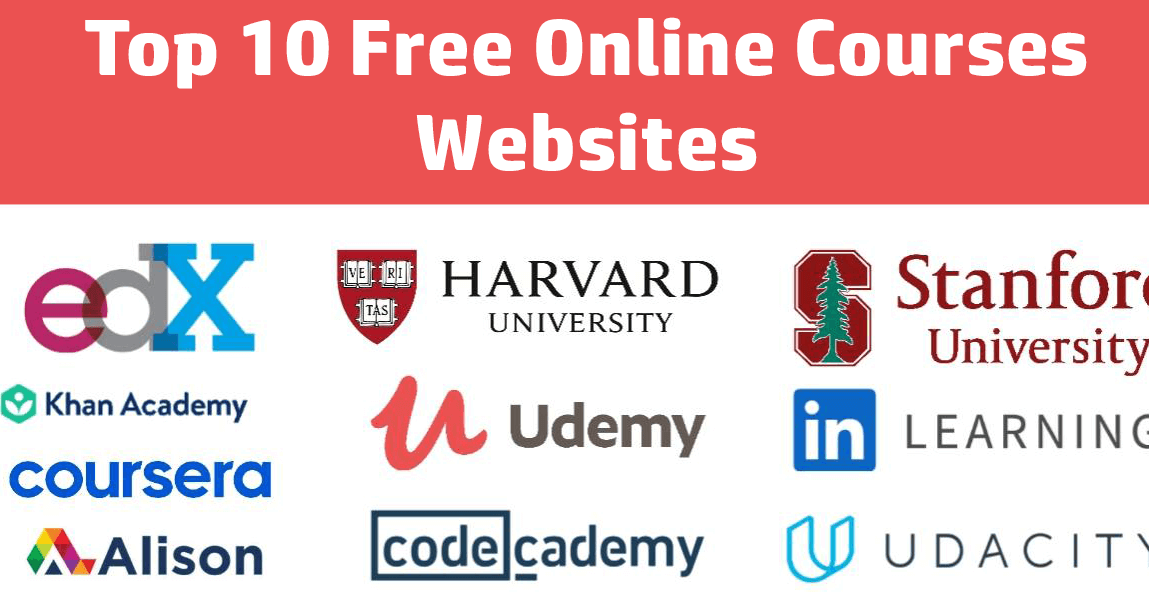In the ever-evolving world of education, prestigious US colleges have embraced the digital age by offering a plethora of free online courses.
These courses are designed to provide quality education to learners around the globe without the financial burden. Here’s a detailed guide to these offerings, including information on requirements, duration, and how to get started.

Harvard University
Platform: edX
Popular Courses:
-
- CS50: Introduction to Computer Science: An entry-level course teaching the fundamentals of computer science and programming using various languages.
- The Science of Well-Being: A course designed to increase your own happiness and build more productive habits.
Requirements: No prerequisites for most courses. Advanced courses might require background knowledge in the subject.
Duration: Typically 4 to 12 weeks.
Certificates: Free to audit, with an option to purchase a verified certificate.
Official Link: Harvard Online Courses on edX
Stanford University
Platform: Coursera
Popular Courses:
- Machine Learning: Taught by Andrew Ng, this course covers the fundamentals of machine learning, data mining, and statistical pattern recognition.
- Introduction to Food and Health: Explores the principles of food and nutrition to promote a healthier lifestyle.
Requirements: Open to all learners, though some technical courses may benefit from prior experience.
Duration: Usually 5 to 11 weeks.
Certificates: Free to audit, with an option to purchase a certificate.
Official Link: Stanford Online Courses on Coursera
Massachusetts Institute of Technology (MIT)
Platform: MIT OpenCourseWare (OCW)
Popular Courses:
- Introduction to Computer Science and Programming Using Python: Teaches the basics of computer science and programming.
- Principles of Microeconomics: Provides an introduction to microeconomic concepts and analysis.
Requirements: Most courses are open to all, but advanced courses may require a background in the subject.
Duration: Self-paced.
Certificates: Free access to course materials, but no certificates are provided.
Official Link: MIT OpenCourseWare
Yale University
Platform: Coursera
Popular Courses:
- The Science of Well-Being: Focuses on what psychological science says about how to be happier.
- Financial Markets: An overview of ideas, methods, and institutions that permit human society to manage risks and foster enterprise.
Requirements: Open to all learners, with no prerequisites.
Duration: Typically 4 to 10 weeks.
Certificates: Free to audit, with an option to purchase a certificate.
Official Link: Yale Online Courses on Coursera
University of California, Berkeley
Platform: edX and Coursera
Popular Courses:
- The Science of Happiness: Explores the roots of a happy and meaningful life through the lens of positive psychology.
- Bitcoin and Cryptocurrencies: Introduces the fundamentals of cryptocurrencies and blockchain technology.
Requirements: Open to all, though some technical courses may recommend prior knowledge.
Duration: Usually 6 to 10 weeks.
Certificates: Free to audit, with an option to purchase a certificate.
Official Link: UC Berkeley Online Courses on edX
Princeton University
Platform: Coursera
Popular Courses:
-
- Bitcoin and Cryptocurrency Technologies: Teaches the basics of how cryptocurrencies work.
- Computer Science: Algorithms, Theory, and Machines: Covers essential information about algorithms and data structures.
Requirements: Open to all, but some courses may benefit from prior knowledge in related fields.
Duration: Typically 6 to 10 weeks.
Certificates: Free to audit, with an option to purchase a certificate.
Official Link: Princeton Online Courses on Coursera
Getting Started
- Choose a Platform: Select a platform based on the courses offered and whether you wish to obtain a certificate.
- Create an Account: Register on the chosen platform, which is typically free.
- Browse Courses: Explore the available courses by subject, duration, and difficulty level.
- Enroll in a Course: Click on the course of your choice and enroll. Many courses allow you to start immediately.
- Set a Schedule: Dedicate regular time slots each week to study, ensuring steady progress through the material.
- Participate Actively: Engage in forums, complete assignments, and participate in any interactive components to enhance your learning experience.
Additional Benefits of Free Online Courses from the Best US Colleges
Free online courses from top US colleges not only offer high-quality education but also come with a variety of additional benefits. Here are some of the key advantages:
1. Flexibility and Convenience
Self-Paced Learning: Many courses allow you to learn at your own pace, accommodating your schedule and learning speed. Access Anytime, Anywhere: Study from any location with an internet connection, making it easier to balance learning with other commitments.
2. Cost-Effective Education
Free Access: The courses are free to audit, removing the financial barrier to accessing education from prestigious institutions. Optional Certificates: While the courses are free, you can choose to pay for a certificate if you want to validate your skills for job applications or personal achievement.
3. Wide Range of Subjects
Diverse Topics: Courses cover a broad spectrum of subjects, from computer science and business to humanities and social sciences, catering to varied interests and career goals. Interdisciplinary Learning: Explore multiple disciplines and integrate knowledge across fields, enhancing your versatility and problem-solving skills.
4. High-Quality Content
Expert Instructors: Courses are taught by leading professors and experts in their fields, ensuring top-notch education. Up-to-Date Material: Content is regularly updated to reflect the latest research and trends in various fields.
5. Career Advancement
Skill Development: Gain valuable skills and knowledge that can boost your resume and enhance your career prospects. Professional Recognition: Certificates from renowned institutions can add significant value to your professional profile and be recognized by employers globally.
6. Networking Opportunities
Global Community: Interact with a diverse group of learners from around the world, expanding your professional and personal network. Engagement with Instructors: Participate in forums and Q&A sessions, providing opportunities to engage with instructors and peers.
7. Lifelong Learning
Continuous Education: Stay updated with new developments and advancements in your field without committing to a full-time program. Personal Enrichment: Pursue courses for personal growth, intellectual stimulation, and the joy of learning something new.
8. Enhanced Digital Skills
Online Learning Platforms: Familiarize yourself with digital tools and platforms used in online education, which are increasingly important in today’s technology-driven world. Technical Proficiency: Many courses, especially in tech and science, enhance your technical skills, making you more proficient in using digital resources.
How to Maximize the Benefits
To make the most of these free online courses, consider the following tips:
-
- Set Clear Goals: Define what you aim to achieve by taking the course, whether it’s acquiring a new skill, exploring a new subject, or enhancing your career prospects.
- Stay Organized: Keep track of deadlines and manage your time effectively to stay on top of your coursework.
- Engage Actively: Participate in discussions, complete assignments diligently, and make the most of any interactive components.
- Network: Connect with fellow learners and instructors to build relationships and expand your professional network.
- Apply Your Knowledge: Try to apply what you learn in real-life situations, whether in your job, personal projects, or further studies.
FAQ) about Free Online Courses from the Best US Colleges
1. What are free online courses?
Answer:
Free online courses are educational programs offered by universities and institutions that can be accessed online at no cost. These courses cover a wide range of subjects and are available to anyone with an internet connection.
2. Which platforms offer free courses from top US colleges?
Answer:
Top platforms offering free courses from prestigious US colleges include:
-
- edX: Hosts courses from Harvard University, UC Berkeley, and others.
- Coursera: Offers courses from Stanford University, Yale University, Princeton University, and more.
- MIT OpenCourseWare (OCW): Provides free access to MIT’s course materials.
3. Do I need to pay to enroll in these courses?
Answer:
No, you can enroll and access the course materials for free. However, if you want to receive a certificate of completion, there is usually a fee.
4. Can I get a certificate for completing a free course?
Answer:
Yes, most platforms offer an option to obtain a verified certificate for a fee. This certificate can be shared on your resume or LinkedIn profile to demonstrate your achievement.
5. Are there any prerequisites for enrolling in these courses?
Answer:
Most courses are open to all learners without prerequisites. However, some advanced courses may recommend or require prior knowledge or experience in the subject area.
6. How long do these courses typically last?
Answer:
The duration varies by course. Most courses range from 4 to 12 weeks, but some may be shorter or longer. Additionally, many courses are self-paced, allowing you to complete them at your own speed.
7. What subjects are available in these free courses?
Answer:
Subjects span a wide range, including but not limited to:
- Computer Science
- Business and Management
- Science and Engineering
- Humanities and Social Sciences
- Health and Medicine
- Data Science
- Personal Development
8. How do I enroll in a free course?
Answer:
To enroll in a free course:
- Choose a Platform: Visit the platform hosting the course (e.g., edX, Coursera, MIT OCW).
- Create an Account: Register for a free account on the platform.
- Browse Courses: Explore the available courses and select the one that interests you.
- Enroll: Click on the course and enroll. You can start learning immediately if the course is self-paced or follow the schedule if it’s instructor-led.
9. Can I interact with instructors and other students?
Answer:
Yes, most courses offer forums or discussion boards where you can interact with instructors and fellow learners. Some courses also include live Q&A sessions, peer reviews, and other interactive elements.
10. Will these courses help in advancing my career?
Answer:
Absolutely. These courses can help you gain new skills, deepen your knowledge, and enhance your resume. Certificates from renowned institutions can be a valuable addition to your professional profile and can be recognized by employers globally.
11. Can I access course materials after the course ends?
Answer:
In many cases, yes. Platforms like edX and Coursera allow you to access course materials even after the course ends. MIT OpenCourseWare also provides permanent access to course materials.
12. How do I stay motivated to complete an online course?
Answer:
Here are some tips to stay motivated:
- Set Clear Goals: Define what you want to achieve from the course.
- Create a Schedule: Dedicate regular time slots each week to study.
- Engage Actively: Participate in discussions and complete assignments.
- Seek Support: Connect with other learners for support and motivation.
- Apply Your Knowledge: Try to apply what you learn in real-life situations.
13. Are there any technical requirements for taking these courses?
Answer:
You need a reliable internet connection and a device (computer, tablet, or smartphone) to access the courses. Some courses may have specific software requirements, which will be mentioned in the course description.
14. Can I take multiple courses at the same time?
Answer:
Yes, you can enroll in multiple courses simultaneously. However, it’s important to manage your time effectively to ensure you can handle the workload of each course.
For more information and to explore available courses, visit the official links provided in the detailed guide above. Happy learning!
Conclusion
With free online courses from some of the best US colleges, you can expand your knowledge and skills from the comfort of your home.
Whether you’re aiming to advance your career, explore a new hobby, or simply learn something new, these courses offer valuable resources to help you achieve your goals.
Start exploring the wealth of knowledge available at your fingertips by visiting the official links provided above. Happy learning!





![Free 5G Government Phones [How to Apply and Get] Free-5G-Government-Phones-pic](https://takeyoursurveys.com/wp-content/uploads/2024/05/Free-5G-Government-Phones-pic-150x150.jpg)
